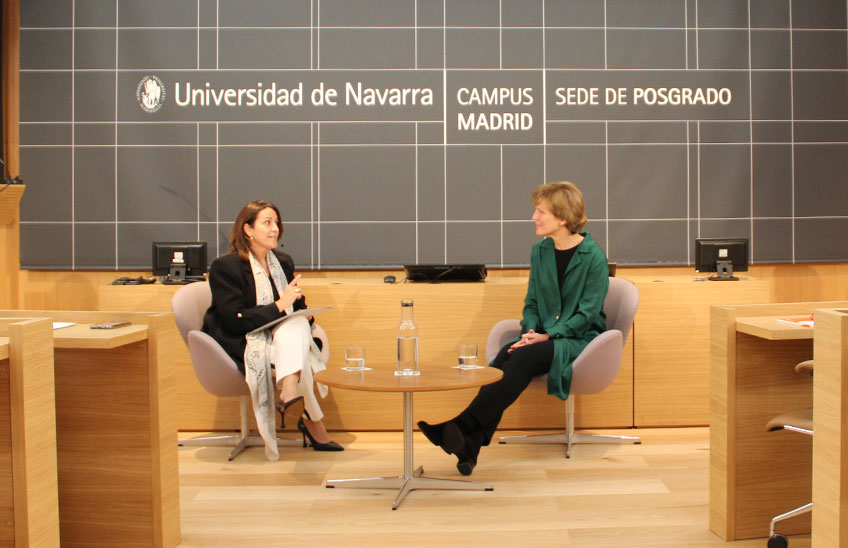María Iraburu: "May each alumnus leave a good mark on the world".
The rector met virtually with alumni during the annual meeting of the Alumni Spain Territorial Boards held on the Madrid campus.

FotoOficinaAlumni-Desarrollo
/Inés García Paine, Alumni President, with the University's President, María Iraburu
21 | 02 | 2022
"The University's contribution to society has two clear visible lines: research and the work of its graduates," said María Iraburu in her first meeting with alumni. In the colloquium, moderated by the Alumni President, Inés García Paine, under the title. "What will the University of Navarra be like in the coming years?", the president outlined the lines of work in the new stage of the University. In her own words, "the evolution of the University has been spectacular. We now have almost a third of international students, which also speaks of the presence of the University and the alumni in the five continents, but the essential continues".
During this meeting, the President also stressed the commitment of the University of Navarra to "train extraordinary professionals who will deploy their talents for the benefit of society. At the same time, she took the opportunity to assure that the University's objective is "that each alumnus leaves a good mark on the world, transforming society.
Along the same lines, María Iraburu emphasized identity and dynamism as ideas that permeate the development of the coming years: "We are at a spectacular moment for our mission: of reflection, of dialogue, of study... that is the University. We have to make this effort to rethink society. Identity also refers to Christian inspiration, in dialogue with faith. And dynamism enters through the changing society, especially through the students".
The Rector did not miss the opportunity to speak about the projects of Strategy 2025 that mark the future of the University. First of all, she referred to the Bioma center, a project which, as she said, "is a space for the entire university and all alumni. A meeting place to talk about nature and science, and to help understand how science is done". Secondly, he referred to the role of alumni in the strategic horizon of the University: "Alumni are essential. You come back to the university to return to study. There are all the Life Long Learning programs, which are part of the 2025 Strategy". Along the same lines, he pointed out that "the University is looking forward to establishing mentoring programs that will make it possible to establish a one-to-one relationship. This humanization that we need throughout our lives.
Among those attending the virtual meeting with Rector María Iraburu were people from Italy, the United Kingdom, Colombia, Argentina, the United States, Mexico, Chile, Peru, Germany, Portugal, Uruguay and Kenya, among others.
Full video of the session
Meeting and work day
Once the colloquium was over, the working sessions of the Alumni Territorial Boards got underway. Twenty-six representatives from all over Spain came to the Madrid Campus to learn in detail about three of the major commitments of the 2025 Strategy that are already underway: continuing education, the Bioma Center and personalized medicine.
Regarding Life Long Learning, or continuing education, Ignacio Gil, director of the Professional Programs Unit, explained the progress that has been made and some of the programs starting this coming March. For his part, Jesús Miguel Santamaría, explained in detail the Bioma Center and the Science Museum, and Antonio Pineda, deputy director of CIMA, explained the challenge of personalized medicine and how work is being done in this area.
With the purpose of knowing the present and future of the University of Navarra, from the Admissions Service, its director Juan José Cabrera valued with gratitude the role of the Alumni Boards for the growth of students at the University of Navarra. He also highlighted the new educational proposals for the next academic year 2022/2023, in line with the identity and dynamism that María Iraburu had mentioned: the Master in Christianity and Contemporary Culture, and the Master in Advanced Nursing Practice in Oncology, presented by the Dean of the Faculty of Philosophy and Letters, Julia Pavón, and the Vice-Dean of the Faculty of Nursing, Nuria Esandi, respectively.
